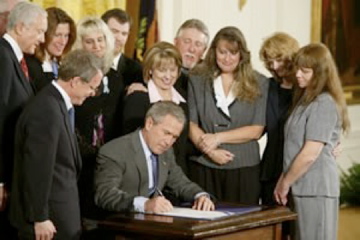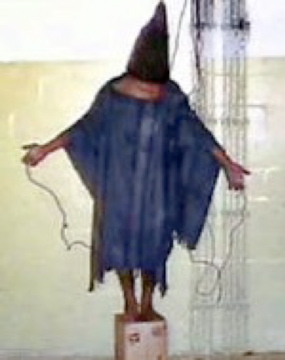ILLEGAL USE OF SIGNING STATEMENTS.
| Charge: |
 George W. Bush has attached signing statements to more than 100 bills before signing them, within which he has made over 1,100 challenges to provisions of laws passed by Congress. This figure exceeds the total number of such challenges by all previous presidents combined, and Bush has used this practice to exempt himself, as President of the United States, from enforcing or from being held accountable to provisions of the said laws. By declining to veto bills, and instead attaching signing statements challenging laws passed by Congress, he has violated Article 1, Section 7 and Article II, Section 3 of the U.S. Constitution. These articles of the Constitution dictate that the president has the option of signing or vetoing a bill, and upon signing the bill to "take care that the laws be faithfully executed." George W. Bush has attached signing statements to more than 100 bills before signing them, within which he has made over 1,100 challenges to provisions of laws passed by Congress. This figure exceeds the total number of such challenges by all previous presidents combined, and Bush has used this practice to exempt himself, as President of the United States, from enforcing or from being held accountable to provisions of the said laws. By declining to veto bills, and instead attaching signing statements challenging laws passed by Congress, he has violated Article 1, Section 7 and Article II, Section 3 of the U.S. Constitution. These articles of the Constitution dictate that the president has the option of signing or vetoing a bill, and upon signing the bill to "take care that the laws be faithfully executed." |
March 20, 2001 - Jan. 12, 2007
Bush issues at least 126 signing statements challenging over 1,149 laws (Christopher Kelley, Ph.D). The exact number of signing statements is unknown as the administration refuses to release this information. Examples of signing statements include:
March 9, 2006: Bush signed the reauthorization of the Patriot Act, which contained requirements for congressional oversight of executive use of the act's powers. In a statement immediately following the signing ceremony, however, it was revealed that Bush "did not feel obliged to obey requirements that he inform Congress about how the FBI was using the act's expanded police powers." (Boston Globe, March 24, 2006) Subsequently, by the FBI's own admission they abused this power given to them. "As many as 600 of these violations could be 'cases of serious misconduct' involving the improper use of 'national security letters' to compel telephone companies, banks and credit institutions to produce records." (Washington Post, March 21, 2007)
 Dec. 5, 2005 & Jan. 6, 2006: Two Detainee Treatment (Torture) Acts were signed into law accompanied by a signing statement. Part of the signing statement read, ''The executive branch shall construe [the law] in a manner consistent with the constitutional authority of the President . . . as Commander in Chief." When asked about the statement, a senior administration official said "the president intended to reserve the right to use harsher methods in special situations involving national security." David Golove, a New York University law professor who specializes in executive power issues, said "The signing statement is saying 'I will only comply with this law when I want to, and if something arises in the war on terrorism where I think it's important to torture or engage in cruel, inhuman, and degrading conduct, I have the authority to do so and nothing in this law is going to stop me." (Boston Globe, Jan. 4, 2006)
Dec. 5, 2005 & Jan. 6, 2006: Two Detainee Treatment (Torture) Acts were signed into law accompanied by a signing statement. Part of the signing statement read, ''The executive branch shall construe [the law] in a manner consistent with the constitutional authority of the President . . . as Commander in Chief." When asked about the statement, a senior administration official said "the president intended to reserve the right to use harsher methods in special situations involving national security." David Golove, a New York University law professor who specializes in executive power issues, said "The signing statement is saying 'I will only comply with this law when I want to, and if something arises in the war on terrorism where I think it's important to torture or engage in cruel, inhuman, and degrading conduct, I have the authority to do so and nothing in this law is going to stop me." (Boston Globe, Jan. 4, 2006)Days after the disaster, Bush looks on.
 Oct. 4, 2006: In the wake of Hurricane Katrina, Congress passed a law setting minimum standards for the job of FEMA Director. This was in direct response to the botched job done by Michael Brown, Bush's choice to lead the agency, who had been a politically connected hire with no prior experience in emergency management. The law said the president must nominate someone who has "a demonstrated ability in and knowledge of emergency management" and "not less than five years of executive leadership." At the signing ceremony, Bush signed the bill without any hint of objection, but included a signing statement saying the law "purports to limit the qualifications of the pool of persons from whom the president may select the appointee in a manner that rules out a large portion of those persons best qualified by experience and knowledge to fill the office. The executive branch shall construe section 503(c)(2) in a manner consistent with the Appointments Clause of the Constitution. " (Boston Globe, Oct. 6, 2006)
Oct. 4, 2006: In the wake of Hurricane Katrina, Congress passed a law setting minimum standards for the job of FEMA Director. This was in direct response to the botched job done by Michael Brown, Bush's choice to lead the agency, who had been a politically connected hire with no prior experience in emergency management. The law said the president must nominate someone who has "a demonstrated ability in and knowledge of emergency management" and "not less than five years of executive leadership." At the signing ceremony, Bush signed the bill without any hint of objection, but included a signing statement saying the law "purports to limit the qualifications of the pool of persons from whom the president may select the appointee in a manner that rules out a large portion of those persons best qualified by experience and knowledge to fill the office. The executive branch shall construe section 503(c)(2) in a manner consistent with the Appointments Clause of the Constitution. " (Boston Globe, Oct. 6, 2006)Two senator's responded to Bush's signing statement in a letter, "We were dismayed ... by the `signing statement' in which you express your intention to disregard provisions in the law intended to protect against further mistakes such as those that plagued the 2005 hurricane response." (Boston Globe, Oct. 12, 2006)
READ MORE ...
No comments:
Post a Comment